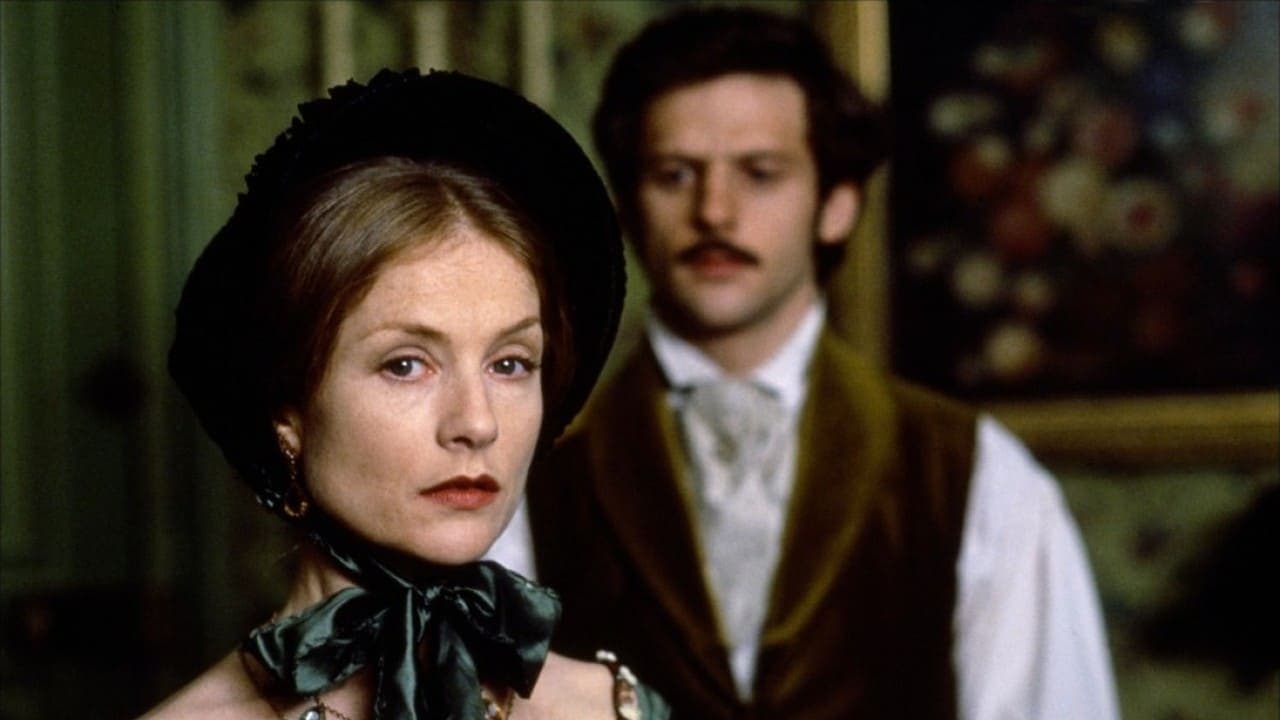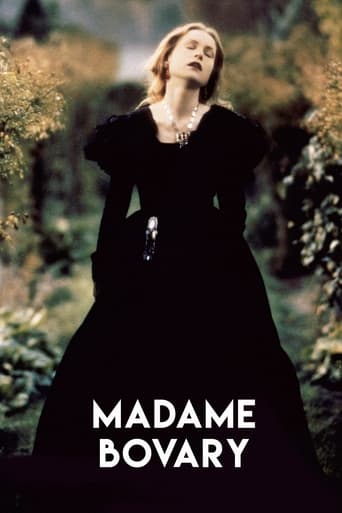

Waste of time
... View MoreAn Exercise In Nonsense
... View MoreAn action-packed slog
... View MoreOne of the worst ways to make a cult movie is to set out to make a cult movie.
... View MoreAccording to French documentaries on the subject, Director Claude Chabrol did his utmost to stay true to Gustave Flaubert's novel. He saw Isabelle Hupert as the perfect fit for Madame B, and everything else apparently fell in place after that. Therein lies my first qualm: Hupert is not as plain as Madame B is supposed to be. Balmer is suitable as the shy, insecure rural doctor she marries. The rest of the cast is good enough, with Madame B's first lover particularly convincing.A voiceover is introduced to link different times in the story, a trick which, I think, did not come off very well. Still, Chabrol's direction is sound, by and large, and photography is a big plus, as are the costumes and period recreation. He manages to convey the disappointment Madame B feels when she realizes that all her loves run for cover when she needs them, and only the husband she despises stays with her to the end.It is a powerful novel and a great psychological study, but, as much as CC tries to remain faithful to Flaubert's literary masterpiece, he allows narrative to run adrift at times, making for an uneven film -- but one which is worth watching at least once.
... View MoreAnybody taking on Gustave Flaubert's Madame Bovary should get some credit for the effort, the book is a classic and one of the greatest pieces of European literature(it's also easy to see why it was so controversial at the time) but it isn't an easy one to adapt at all with some very easy traps to fall into(making the characters one-dimensional for one). Of the three adaptations of the book seen so far personally- the others being the 2000 and 1949 versions-, this one is the most faithful but also the one that resonated with me least. There is much to like still, for one it looks absolutely gorgeous with very picturesque scenery, evocative settings, make-up and costuming and photography that is elegant and alive with colour. The music is hauntingly understated and lyrical, underlying the atmosphere while letting the drama speak. Claude Chabrol directs with a deft if at times clinical hand, particularly good in showing how rigid socially and morally mid-19th century French provincial life was. The performances are also great. Isabelle Huppert can understandably be seen as cold(to be honest Emma is the main reason why the book adaptation-wise is not that accessible because it is not easy to feel genuine sympathy for her), especially compared to Frances O'Connor and Jennifer Jones, and maybe she is not youthful enough in the early scenes but her classic beauty makes her perfect for period drama and she does act with coolness and poise but there is a sense of being stifled and being a victim of her own passions. Jean-Francois Balmer is appropriately mild-mannered and sympathetic if somewhat equally appropriately clueless as her husband. While Christophe Malavoy has the suavity and enigmatic menace just right and Lucas Belvaux is gentle without being dull. Jean Yanne shows Homais' unscrupulousness very well, and Jean-Louis Maury is good also as the malefic L'Heureux. Some things didn't come across as well. That it is faithful in detail to the book is laudable(most of the dialogue word for word), but it is one of those cases like the 1974 adaptation of The Great Gatsby of being too faithful that the dialogue while astonishingly literate and poetic lacks spark and emotion, the irony that surrounds Emma's tragic plight doesn't come across very well. The voice over doesn't really serve a point to the storytelling when it could have easily been said or shown, and that it is incorporated late and sparingly further gives it that notion. The story of the book is slow to begin with so it was not a bad thing for the adaptation to match the book's pacing. The thing is though the book's love scenes were passionate and there is also a lot of irony and bite. That the love scenes here were more coy than passionate(some of the chemistry looks uncomfortable), themes like the anti-clerical statements(quite savage ones at that) used in the book being excised and the writing having the poetry but not the irony made it not so easy to engage with and it all feels rather tame. The first half is often very ponderous and there is the sense that while the details are there what made the book so meaningful and shocking was lost. Overall, looks beautiful, skilfully directed and well-acted, but as a result of being too faithful emotionally and spirit-wise it felt cold and rather tame. The 2000 and 1949 also weren't as biting as the book, and they were nowhere near as faithful, but did have what this version didn't have. 6/10 Bethany Cox
... View MoreMadame Bovary enters an unhappy marriage to move up the social ladder. From here she indulges in a number of illicit affairs that leads to serious complications.First off I have to say that I don't really know anything about the novel from which this was adapted. From what I have briefly read it seems that it was considered unfilmable for some reason. Having seen this movie now, it does have to be said that it is a slightly odd costume-drama. Its story isn't especially romantic and it's not the most focused narrative overall. While I would say that Isabelle Huppert puts in a strong performance in the lead role, it's quite difficult really caring too much what happens to her. None of the characters in the film are particularly sympathetic. I guess the blame for this has to go to director Claude Chabrol. I have seen several of this director's movies from his late 60's early 70's heyday and have to consider myself a fan. All of those films were morally complex but contemporary stories. Madame Bovary shares some of the moral ambiguity but has an unfamiliar period setting. Chabrol directs the film in a somewhat cold manner, making it difficult to empathise with anyone. However, that said it's still a compelling film. The first half is pretty ponderous but it picks up steam in the second as the twists and turns in Madame Bovary's life are ramped up. So not classic Chabrol by any means but an interesting diversion all the same.
... View MoreI am usually the most avid of Chabrol fans, but with Madame Bovary he finally made a real turkey. This film is dull dull dull. I probably could have abided the tediousness and the fastidious faithfulness to the book if the film had a lead actress who was even remotely credible in the lead. But Huppert is woefully miscast as Emma. Emma Bovary is supposed to be a passionate woman who recklessly throws herself into adulterous affairs. Huppert plays Emma as an ice princess, about as passionate as a bowl of oatmeal! Huppert achieves the astonishing feat of maintaining the same facial expression throughout the film; at times I wondered if her facial muscles were paralyzed. This would have been a perfect role for Isabel Adjani...too bad. Read the book instead.6/10
... View More